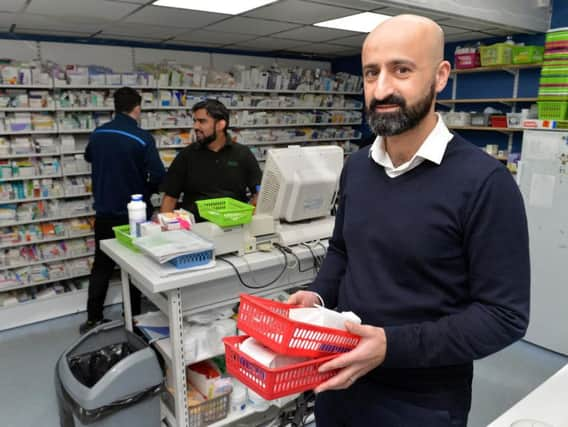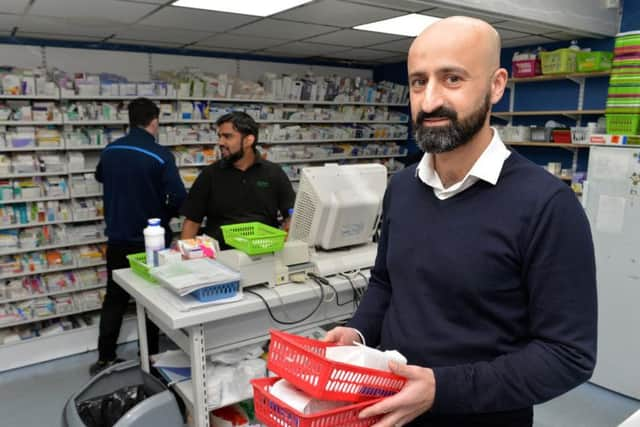This is why the NHS in Leeds is urging people to go to pharmacies first with minor illnesses


But despite their extensive training, many people often choose to visit a GP or A&E departments before pharmacies in search of help over minor illnesses.
Winter health series day one: Leeds A&E under pressure as doctors deal with thousands of extra patientsWhen faced with niggling sore throats, blocked noses or coughs, the first thought can be to book an appointment to see a GP.
Advertisement
Hide AdAdvertisement
Hide AdBut as pressure continues to mount over winter for under-strain surgeries, the NHS is urging patients instead to consider speaking to a pharmacist for instant and free advice, avoiding long appointment waits and loosening the squeeze on GPs.


“Pharmacists have always been there and they should be the first port of call before a GP,” said Adeel Sawar, a pharmacist with nearly 20 years’ experience in Leeds.
“Somewhere along the line that message has been lost.
“We want to reassure the public that we are here and that there are lots of treatments available.”
Winter health series day two: This pilot scheme could see a paramedic called out instead of a GP to your home in LeedsQualifying in 1999, Mr Sawar has been tending to residents with healthcare tips at Roundhay Pharmacy since 2004.
Advertisement
Hide AdAdvertisement
Hide Ad“We train to identify what can be resolved and what might be more serious so it’s in everybody’s best interest to come and see us when you could have to wait a week for a GP appointment,” he said.
“It’s more convenient to attend the pharmacy and to deal with the matter as soon as possible.
“A lot of acute illnesses can be nipped in the bud then.”
Despite some public opinion, pharmacists attend many of the same lectures as doctors before they qualify, and are capable of offering informed and often invaluable advice to patients with minor illnesses.
“We are all trained healthcare professionals,” Mr Sawar said.
Advertisement
Hide AdAdvertisement
Hide Ad“We have been to university for four years and then we have done another postgraduate year on top of that.
“Many of us have trained alongside doctors at university - and attended the same lectures.”
Winter health series day three: This cafe is helping socially-isolated older people in Leeds as figures say 37,000 are 'lonely' in cityThe advice is always free from a pharmacist but people may have to pay for any treatment that they purchase, he said.
And it isn’t just cold and flu questions that pharmacists can help with.
Advertisement
Hide AdAdvertisement
Hide AdThey are trained to advise patients on health concerns ranging from mild skin conditions, constipation, allergies, ulcers or toothache among dozens of other minor illnesses.
“We are trained to diagnose and treat some of the more common self-limiting conditions that people have,” Mr Sawar said.
“We are also trained to identify when to refer patients on to GPs. GPs don’t want to be seeing people for those minor ailments - they are there for more serious, chronic conditions.”
Because those referrals for more serious conditions are coming from another healthcare professional, some patients may often get an appointment quicker with a GP, if their illness cannot be treated at the pharmacy.
Advertisement
Hide AdAdvertisement
Hide AdMost pharmacies also have a consultation room at their premises, for patients who need to speak to staff in private. Meanwhile, as winter ramps up, people in need of vaccinations such as the flu jab can have them at pharmacies, too.
Vaccinations offered include travel immunisations as well as the seasonal flu jab.
“Patients may find it more convenient to get their jabs here,” Mr Sawar said.
“It just helps to reduce the burden on resources at doctors’ surgeries.
Advertisement
Hide AdAdvertisement
Hide Ad“Pharmacists can also offer advice on how to take medicines, for example if you have asthma - how to use the inhaler.
"If people think they are suffering side effects, or don’t know when or how to use their medication, we can offer advice on that too.”